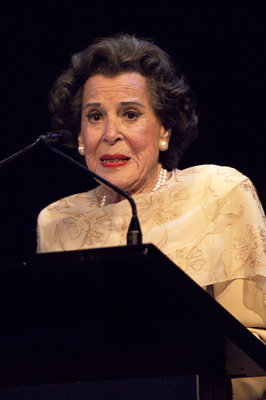Kitty Carlisle
ActressBiografía
Kitty Carlisle Hart wore a cloak of many professional and elegant colors. Actress, opera singer, Broadway performer, TV celebrity, game show panelist, patron of the arts, and, at age 95, this vital woman continued her six-decade musical odyssey with songs and reminisces in her one-woman show: “Kitty Carlisle Hart: An American Icon,” which toured from her beloved New York to Los Angeles. She developed pneumonia soon after her tour folded toward the end of 2006 and passed away of congestive heart failure in April of 2007. Kitty Carlisle Hart was born Catherine Conn (pronounced “Cohen”) on September 3, 1910 in New Orleans, Louisiana, to a family of German Jewish ancestry. Her father, Dr. Joseph Conn, was a gynecologist who died when she was only ten. Her very ambitious mother, Hortense (Holzman), escorted Kitty to Europe in 1921 with the intentions of marrying her off, Grace Kelly-style, into European royalty. When that plan didn’t pan out, they stayed in Europe where Kitty received her adult education in Switzerland, London, Paris and Rome. She finally zeroed in on her acting career after being accepted into London’s Royal Academy of Dramatic Art, and also went on to train at the Theatre de l’Atelier in Paris. She and her mother eventually returned to New York in 1932 wherein she first apprenticed with the Bucks County Playhouse in New Hope, Pennsylvania. She attracted notice quite early in her career. Billed as Kitty Carlisle, she found radio work and made her first appearance on the musical stage in the title role of “Rio Rita.” The legitimately-trained singer went on to appear in a number of operettas, including 1933’s “Champagne Sec” (as Prince Orlofsky), as well as the musical comedies “White Horse Inn” (1936) and “Three Waltzes” (1937). Her early ingénue movie career included warbling in the musical mystery Murder at the Vanities (1934), and alongside Allan Jones amidst the zany goings-on of the Marx Brothers in the classic farce A Night at the Opera (1935). She also played a love interest to Bing Crosby’s in two of his lesser known musical outings Here Is My Heart (1934) and She Loves Me Not (1934). Films were not her strong suit, however, and she returned to her theatre roots. Appearing in her first dramatic productions “French Without Tears” and “The Night of January 16th” in 1938, she went on to grace a number of chic and stylish plays and musicals throughout the 40s, including “Walk with Music (1940), “The Merry Widow” (1943, “Design for Living (1943) and “There’s Always Juliet” (1944). She subsequently performed in Benjamin Britten’s 1948 American premiere of “The Rape of Lucretia.” In 1946, she married Pulitzer Prize-winning playwright Moss Hart and appeared in a number of his works including his classic “The Man Who Came to Dinner” (1949) and the witty Broadway comedy “Anniversary Waltz” (1954). The couple had two children. He died in 1961 and she never remarried, spending much of her existing time keeping his name alive to future generations. It was the small screen that would make Kitty a welcome household commodity. The steadfast panelist of several quiz shows in the 1950s, it was the popular game show To Tell the Truth (1956) that anointed her game show doyenne and icon. A regular panelist for some 20 years, she appeared on each and every revamped format from its 1956 inception to its 2002 syndicated version. Known for her stately presence, infectious laugh, pouffy dark Prince Valiant hairstyle, and sweeping couture gowns on the show, audiences reveled at her effortless class to these simple parlor games. She also was a substitute panelist for other popular game shows such as “What’s My Line?” and “I’ve Got a Secret.” In later years, she became an important society maven of New York City, an avid patron and zealous supporter of the performing arts. Appointed to various state-wide councils, she was chairman of the New York State Council of the Arts in 1976 and served in that capacity for 20 years, also serving on the boards of various New York City cultural institutions. A noted lecturer, the civic-minded Carlisle Hart was active in administrative capacities as well, notably as Chairman of Governor Rockefeller’s Conference on Woman (1966) and as special consultant to the Governor on women’s opportunities. At one time she wrote the column “Kitty’s Calendar” for Women’s Unit News. Kitty never stopped entertaining. Making her Metropolitan debut on New Year’s Eve 1966 as Prince Orlovsky in “Die Fledermaus,” she joined the touring production the following year. She appeared in concert with the Philadelphia Orchestra and appeared with the Boston Opera Company at one point. She added stature to a number of summer stock plays including “Kiss Me Kate,” “The Marriage-Go-Round” and her husband’s “Light Up the Sky.” Returning to Broadway as a replacement for Dina Merrill in the 1983 revival of “On Your Toes,” she was later spotted in Woody Allen’s Radio Days (1987) and Six Degrees of Separation (1993). Carlisle penned her autobiography, Kitty, in 1984.

